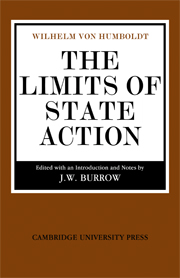Book contents
- Frontmatter
- Contents
- Editor's Introduction
- ON THE LIMITS OF STATE ACTION
- NOTE ON THIS EDITION AND TRANSLATION
- Contents
- CHAPTER I Introduction
- CHAPTER II Of the individual man, and the highest ends of his existence
- CHAPTER III On the solicitude of the State for the positive welfare of the citizen
- CHAPTER IV Of the solicitude of the State for the negative welfare of the citizen—For his security
- CHAPTER V On the solicitude of the State for security against foreign enemies
- CHAPTER VI On the solicitude of the State for the mutual security of the citizens—Means for attaining this end—Institutions for reforming the mind and character of the citizen—National education
- CHAPTER VII Religion
- CHAPTER VIII Amelioration of morals
- CHAPTER IX The solicitude of the State for security more accurately and positively defined—Further development of the idea of security
- CHAPTER X On the solicitude of the State for security with respect to actions which directly relate to the agent only (Police laws)
- CHAPTER XI On the solicitude of the State for security with respect to such of the citizens' actions as relate directly to others (Civil laws)
- CHAPTER XII On the solicitude of the State for security as manifested in the juridical decision of disputes among the citizens
- CHAPTER XIII On the solicitude for security as manifested in the punishment of transgressions of the State's laws (criminal laws)
- CHAPTER XIV On the care of the State for the welfare of minors, lunatics, and idiots
- CHAPTER XV Measures for the maintenance of the State—Completion of the theory
- CHAPTER XVI Practical application of the theory proposed
- Other works by Wilhelm von Humboldt
- Select Bibliography
- Index
- CAMBRIDGE STUDIES IN THE HISTORY AND THEORY OF POLITICS
CHAPTER XI - On the solicitude of the State for security with respect to such of the citizens' actions as relate directly to others (Civil laws)
from ON THE LIMITS OF STATE ACTION
Published online by Cambridge University Press: 05 February 2015
- Frontmatter
- Contents
- Editor's Introduction
- ON THE LIMITS OF STATE ACTION
- NOTE ON THIS EDITION AND TRANSLATION
- Contents
- CHAPTER I Introduction
- CHAPTER II Of the individual man, and the highest ends of his existence
- CHAPTER III On the solicitude of the State for the positive welfare of the citizen
- CHAPTER IV Of the solicitude of the State for the negative welfare of the citizen—For his security
- CHAPTER V On the solicitude of the State for security against foreign enemies
- CHAPTER VI On the solicitude of the State for the mutual security of the citizens—Means for attaining this end—Institutions for reforming the mind and character of the citizen—National education
- CHAPTER VII Religion
- CHAPTER VIII Amelioration of morals
- CHAPTER IX The solicitude of the State for security more accurately and positively defined—Further development of the idea of security
- CHAPTER X On the solicitude of the State for security with respect to actions which directly relate to the agent only (Police laws)
- CHAPTER XI On the solicitude of the State for security with respect to such of the citizens' actions as relate directly to others (Civil laws)
- CHAPTER XII On the solicitude of the State for security as manifested in the juridical decision of disputes among the citizens
- CHAPTER XIII On the solicitude for security as manifested in the punishment of transgressions of the State's laws (criminal laws)
- CHAPTER XIV On the care of the State for the welfare of minors, lunatics, and idiots
- CHAPTER XV Measures for the maintenance of the State—Completion of the theory
- CHAPTER XVI Practical application of the theory proposed
- Other works by Wilhelm von Humboldt
- Select Bibliography
- Index
- CAMBRIDGE STUDIES IN THE HISTORY AND THEORY OF POLITICS
Summary
The subject to which we have now to direct our attention—one of less difficulty, at least for the present inquiry—is the case of actions which immediately affect others. For where rights are infringed by such actions, it is clearly the duty of the State to restrict them, and compel the agents to repair the injury they have inflicted. But according to our previous definition, these actions are unjust only when they deprive another of a part of his freedom or possessions without his consent or against his will. When any one has suffered wrong, he has a right to redress; but when once, as a member of a community, he has transferred his private revenge to the State, to nothing more. The man, therefore, who has committed the wrong, is bound to restore to the man who has sustained it whatever he has been deprived of; or, if this be impossible, to make compensation to the full extent of his means, and of what he can earn. To deprive a man of his personal liberty—as is practised, for instance, in the case of insolvent debtors—can only be regarded as a subsidiary means, where otherwise the creditor should run the risk of losing the debtor's future earnings. Now while the State is not to refuse any just means of redress to the person injured, it must take care that a spirit of revenge does not turn this fair demand into a pretext for injustice.
- Type
- Chapter
- Information
- The Limits of State Action , pp. 93 - 102Publisher: Cambridge University PressPrint publication year: 1969



